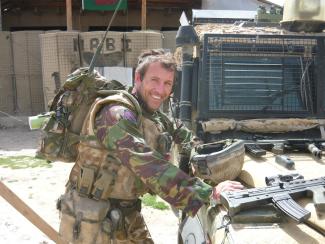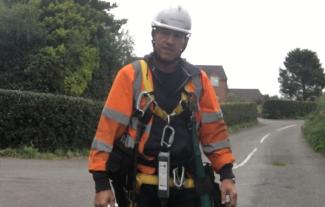Nothing was going to stop me being a soldier

Think people who stammer can't work in the armed forces? Think again. Ian Edwards Jones served in the British Army for 23 years and here writes about how he rose through the ranks and proved the doubters wrong.
My name's Ian and I served 23 years in the Welsh Guards, rising through the ranks from Guardsman (private soldier) to Colour Sergeant (Staff Sergeant). During this time I served on multiple tours and military training exercises worldwide.
Being a soldier was all I wanted to do in life, ever since I watched the footage from the Falklands war when I was around 10 years old. I enlisted when I was 17 and I can't lie, I was a little doubtful if I would pass, and a little nerves showed if I can remember.
After proving my other abilities I started gaining respect from others.
But I got in. It was a nervous time, as you can imagine; a young man who stammers entering a tough environment for a career. Some of the other recruits were shocked, some laughed and there was some mickey-taking. But I mostly ignored it and showed others I was better than them in other ways. I had a few fights over it, and had to stand my ground. This was back in 1988-1990, so the military was still a little 'old school' back then, shall we say.
But most people gave me time to say what I was trying to say. I think there was a willpower in me to show them that I wanted to be there and that nothing was going to stop be being a soldier. That empowered me. After proving my other abilities to individuals and senior ranks, such as being fitter than most, strong willed and dedicated, I started gaining respect from others. Throughout all of this I did attend a speech therapy session for a month in my early days of the military.
Rising through the ranks
After a while I was offered a promotion to Lance Corporal and for that I had to take a course. This was kind of make or break for me. I attended the course, again a little nervous. But I came out in the top 10 out of 60+ students. I later found out that senior ranks thought I'd fail.
This kind of lit up my career and confidence. I wanted to go further and show others that a stammer was nothing. I climbed the command level, each time attending courses. These were intended to develop individuals for their next rank, deployment and task. Each course involved spending weeks or even months away, learning a great deal of interpersonal skills and delivering detailed orders to an audience of other soldiers. These audiences could be made up of anything up to 70 total strangers, all looking at you, staring and waiting for you to speak and deliver your detailed plan.
In time, I rose to the rank of Sergeant, which is a busy role. I was in charge of a platoon of 40-50 soldiers, and had to give daily briefings, tasks, and organise duties. The rank also came with a lot of face-to-face meetings and telephone calls with more senior ranks.
I was then selected to instruct as a Sergeant in a training department, running the Household Regiment and Parachute Regiment Centralised Courses. I spent two years instructing younger soldiers in marching drills, how to command, map reading, tactics, etc. This involved teaching several daily lessons to total strangers — future military commanders.
Further on in my career I became the Operations Colour Sergeant for special covert duties. Before being selected I had to pass a difficult, demeaning course producing highly detailed plans to an audience, having to answer multiple questions that were fired at me constantly. At times I had to speak to a foreign military audience.
This kind of lit up my career and confidence. I wanted to go further and show others that a stammer was nothing.
Later, towards the end of my career, I was deployed to Afghanistan and was in charge of British soldiers and local military, amounting to 70-80 individuals. My orders, plans and instructions all had to be delivered by mouth or by radio.
Post-army career

After leaving the British military I looked after VIP's in hostile countries for over six years. Through that I met some wonderful people, experienced new cultures and had to do a great deal of teaching in groups and one-to-one.
My current career is as a phone and broadband engineer, which involves meeting strangers every day, as you can imagine. I still stammer now, daily. I guess I have met many people who stammer over the years. I'm not saying I'm great, far from it. What I'm saying is, in a way you should enjoy things and not let a stammer get in the way.
This is me, my stammer and my best mate.
If you're in the UK Armed Forces, or if you are thinking of enrolling, and you stammer, the STAMMA Defence network can support you.
Read more Your Voice articles. Want to write a piece yourself? See Submit Something For The Site or email editor@stamma.org for details.

































